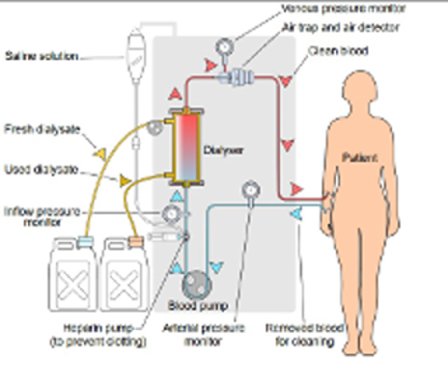The image is credited to Michaelberry at English Wikipedia. It is used under a Creative Commons Attribution 3.0 Generic license.
It is likely that everyone reading this post has either been admitted to a hospital, or knows someone who has been admitted. If that's the case, then an IV drip should be a familiar procedure. In my experience, establishing a drip is almost routine. It also dramatically increases the stress of being in the hospital. But this post is not about the unpleasantness of IV therapy. It's about the fact that most hospitals in the U.S. are not incorporating the most recent research on intravenous infusion in their practice. This is a serious breach, given that the latest research suggests current policy can result in illness, and death.
According to a report published in the New England Journal of Medicine, (Balanced Crystalloids versus Saline in Noncritically Ill Adults, March 1, 2018), replacing the customary saline bag with a "balanced fluid" solution would save thousands from suffering fatal and nonfatal kidney disease. The estimated number of people affected may be as much as 100,000, per a year.

The image is credited to YassineMrabet Talk. It was uploaded from Wikimedia Commons and is used under a Creative Commons Attribution 3.0 Generic license. The diagram shows what happens during one type of kidney dialysis.
The research on which the AJM article is based was carried out by Vanderbilt University, in Nashville, TN. At Vanderbilt, doctors have changed IV infusion practices throughout their system as a result of the findings. Other hospitals, it seems, have not followed suit because they're used to the saline. Cost differential between the two types of infusion solution appears to be minimal.
In a traditional saline drip, referred to generally as "normal saline", the percent of sodium chloride (NaCl) is 0.9%. According to a team of doctors at Zhejiang University, there's nothing "normal" about this. The saline drip has too much sodium (Na), and too much chloride (Cl). Both levels are higher than those found in human blood. The doctors at Zhejiang describe serious consequences that infusion with saline may have in some patients. The doctors suggest that when considering which type of infusion therapy to use, doctors should give their decision the same weight they give the decision to administer a drug.
There may be cases in which saline is a superior choice. The point of this blog is simply this: saline should not be prescribed routinely. It should be the best option for each patient, and the reason for its use should be explained. Justification for that choice should be part of the patient's medical record.
If you've read this far, and are not squeamish yet, I've added a bonus at the end of the post. Here you will find listed possible complications that may arise from the administration of an IV drip, any IV drip. Even in a procedure as common as establishing an IV line, something can go wrong. The partial list here was derived from a website maintained by the Columbia University School of Dentistry. If you want to know more about each complication (I don't), refer to the website.
Infiltration
Hematoma
Air embolism
Phlebitis
Extravascular drug administration
Intraarterial injection
Engaging topic, good post. Most people never think twice about that drip. I always thought "normal" saline would be too concentrated...that's one mole (88 g) of salt in a one liter bag! That's equivalent to 23,000 mg of sodium (calculated mole fraction of Na in NaCl).
Downvoting a post can decrease pending rewards and make it less visible. Common reasons:
Submit
My background is in history, literature and languages--these technical posts are challenging. But I want to understand, so I struggle on. Check and double check. You are so fluent in the sciences--I'm glad the post passes muster with a pro. Thanks for the feedback :)
Downvoting a post can decrease pending rewards and make it less visible. Common reasons:
Submit
Seems like they would dehydrate instead of hydrate!
Downvoting a post can decrease pending rewards and make it less visible. Common reasons:
Submit
nice post!
Downvoting a post can decrease pending rewards and make it less visible. Common reasons:
Submit
Hello there. IV therapy can effectively hydrate your body and provide it with nutrition. Besides, they also help you to overcome exhaustion and boost your immune system. It is important to note that IV therapy should only be used under the supervision of a qualified healthcare professional, check for more information iv therapy near me. They will be able to assess whether or not it is an appropriate treatment option for your particular condition or symptoms and provide guidance on how best to use it for maximum benefit.
Downvoting a post can decrease pending rewards and make it less visible. Common reasons:
Submit